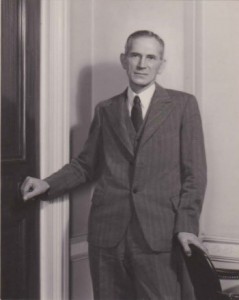Earlier this year, Special Collections and Archives were delighted to receive two boxes of material relating to research undertaken by Henry Eaves, a former Secretary of Cunard.

Henry Eaves’ career with Cunard began when he took up the position of clerk in the Secretary’s Office in 1910. During the First World War he served alongside many of his colleagues as a member of the 17th Battalion of The King’s Regiment Liverpool. By 1931 Henry Eaves had become Assistant Secretary for Cunard and was promoted to the position of Secretary in 1950. After official retirement in 1955 Henry Eaves was asked by Cunard to research the history of the Company and was given the use of an office three half days a week.
In Cunard and the North Atlantic 1840-1973: a history of Shipping and Financial Management, Professor Francis E. Hyde pays tribute to the effort made by Henry Eaves in preparing a chronological account of the history of the Company:
“Most large companies have their own historians. In the case of Cunard, one must not overlook Henry Eaves, a former Secretary . . . his unpublished history of Cunard, drawn largely from Board Minutes and Chairmens’ Reports, has been of considerable assistance in the provision of source material.”
The collection contains Henry Eaves’ research files and sections of his unpublished history of the Cunard Company. Comprising handwritten and typed notes, largely formed of extracts from Board Minutes, Chairmen’s Reports and letter books, the collection also includes letters, news clippings, Cunard Annual reports, photographs and other related items collected during his working career.
The catalogue for Henry Eaves’ papers (D1148) is now available online and can be found within the Cunard Associated Deposits; a collection of items that have been donated by individuals with personal connections to the shipping company. These records complement the main business papers that form the Cunard Archive.
Further sections of Henry Eaves’ research notes on the history of the Cunard Company can be found within the Public Relations series of the Cunard Archive: D42/PR3/28.